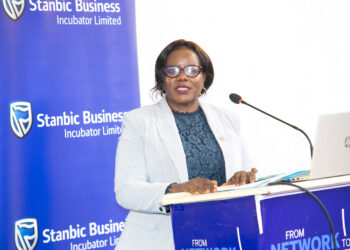Denis Kibuuka Musoke, the head of consumer banking dfcu bank has resigned.
According to sources at the commercial bank, Musoke resigned due to internal fights at the troubled bank. He quit to join Top Finance bank.
Last month, Dr Winfred Tarinyeba Kiryabwire also left her role as a non-executive director at the bank.
According to an internal memo, she resigned due to commitments she is due to undertake in another entity.
Tarinyeba who joined DFCU in September 2013, follows Agnes Tibayeita Isharaza who crossed to NSSF to serve in the same role as company Secretary.
The development comes at a time when dfcu is still grappling to clear its name in the general public following its controversial takeover of Crane Bank.
In October 2016, BoU took over Crane Bank on grounds of undercapitalization, placed it under receivership before selling it to dfcu in January 2017.
Evidence tabled before the Parliamentary Committee on Commissions, Statutory Authorities and State Enterprises (Cosase) showed that BoU gave dfcu two and half years to pay the Shs200 billion without interest and by December 2018, the commercial bank was still owing the Central bank Shs112 billion.
In his confidential special audit report to parliament in 2018, Auditor General John Muwanga said the Purchase of Assets and Assumption of Liabilities (P&A) deal Bank of Uganda officials signed with dfcu on January 25, 2017 for the purchase of Crane Bank Limited, formerly owned by property mogul Sudhir Ruparelia and others, didn’t follow the right procedures.
“I was not provided with the negotiation minutes leading to the P&A agreement. In the absence of the minutes, I could not determine how Bank of Uganda selected the best evaluated bidder and how the terms in P& A were determined,” the report adds.
When it came to the valuation of assets and liabilities of Crane Bank before the Dfcu takeover of the bank at Shs200 billion, the AG said, “On April 10, 2018, I requested for P&A agreement, including details of the assets and liabilities transferred after taking into account the requisite valuation. I noted that BoU did not carry out a valuation of the assets and liabilities of CBL. In the absence of the valuation, I could not establish how the terms for the transfer of assets and liabilities in the P&A were determined.”
Recently, dfcu posted its 2018 profits indicating a sharp fall from its 2017 results. The results indicate a decline in the deposits, the bank registered 0.4 per cent decline from Shs1.987 trillion registered in 2017 to Shs11.979 trillion in 2018.
On the other hand, last week, the bank was also given 30 days until March 19, to pay consulting firm Real Marketing $266,000 (ShS995,813,596) for breach of contract.
The matter arose from a loan and its collateral from the defunct Global Trust Bank, whose assets and liabilities it inherited after the latter’s closure by the Central Bank about five years ago.
According to theeastafrican.co.ke, at the time, Real Marketing bought 10 acres of land that forms part of 43 acres from Global Trust Bank. The firm paid Shs520 million.
The title of the land was held by the bank as a mortgage from defunct real estate dealer, Hossana.
Global Trust Bank had powers under the mortgage to sell the property without recourse to court if the money Hossana owed it was not paid. Hossana defaulted and the bank moved to sell the land.
Real Marketing paid partly by cash and partly borrowed the loan from the same bank to pay. The agreement between Global Trust Bank and Real Marketing was that upon completion of loan repayment, the bank would pass over vacant possession of the 10 acres.
At the time Global Trust Bank was placed under receivership, Real Marketing had not completed repayment.
Dfcu bank took over the closed bank’s liabilities and assets in 2014, and hence became responsible for the transaction involving Real Marketing.
Even though Real Marketing completed repayment of the loan balance through new DFCU’s ownership, and was duly issued with a certificate, the bank did not hand over the land in spite of several remainders, leading to the legal battle.
“Denying the plaintiff title for five years was to create a painful economic upset,” said Justice David Wangutusi in his judgment.
“In conclusion, judgment is entered in favour of the plaintiff … the defendant delivers the certificate of title for the suit land together with the transfer instrument within 30 days. In default of which they will refund Shs523,550,000 ($140,000).”
The court also awarded interest on that money at 30 per cent, which reflects the commercial value of money since 2013 when the transaction was initiated.
Do you have a story in your community or an opinion to share with us: Email us at editorial@watchdoguganda.com











